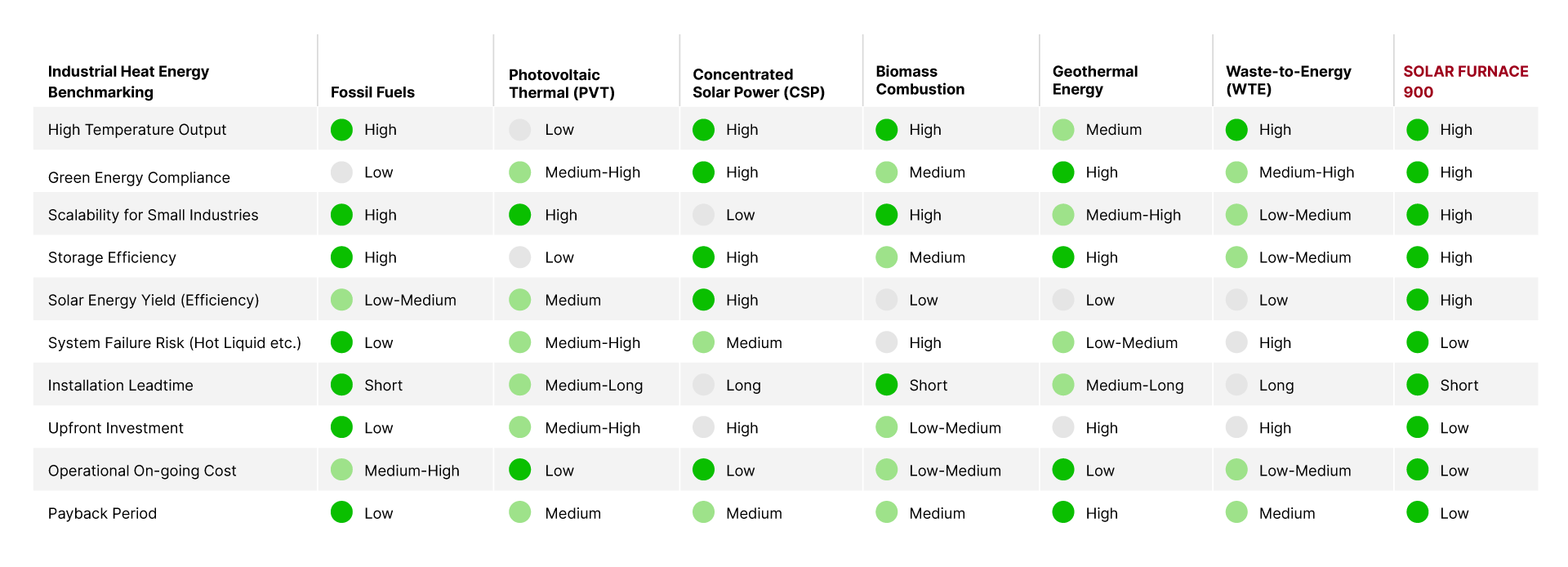EXISTING TECHNOLOGIES
Existing Technologies – Industrial Heating
1.
Fossil Fuels, including coal, natural gas, and oil, have been traditionally used by industries for heat generation. They are burned in boilers or furnaces to produce heat, which is then utilized for various industrial processes. However, fossil fuels are non-renewable resources and their combustion contributes to greenhouse gas emissions and air pollution.
2.
Concentrated Solar Power (CSP) systems use mirrors or lenses to concentrate solar radiation onto a receiver, generating heat that can be used for industrial processes. CSP can achieve high temperatures and offers the advantage of thermal energy storage, allowing for continuous heat supply even when the sun is not shining. It is a renewable energy option that can help reduce carbon emissions.
There are various heat energy solutions for industries, each with its own advantages and disadvantages.
3.
Photovoltaic Thermal (PVT) systems combine photovoltaic (PV) cells and thermal collectors to generate both electricity and heat from solar radiation. PVT systems integrate the generation of electrical and thermal energy, offering a dual-purpose solution for industries. They can be used for on-site electricity production while capturing and utilizing waste heat for industrial processes.
4.
Biomass Combustion involves the burning of organic materials, such as wood pellets, agricultural residues, or dedicated energy crops, to generate heat. It is a renewable energy option that can provide sustainable heat for industrial applications. Biomass combustion systems can be used in boilers or furnaces to produce heat, and they offer the advantage of utilizing organic waste materials.
5.
Geothermal Energy harnesses heat from within the Earth's crust to generate electricity or provide direct heat for industrial processes. Geothermal power plants extract heat from geothermal reservoirs and convert it into electricity or direct heat. The availability and suitability of geothermal energy vary based on the geology and heat resources of a particular location.
6.
Waste-to-Energy (WTE) technologies convert solid waste, such as municipal solid waste or agricultural residues, into heat energy through thermal conversion processes. WTE systems help reduce waste volumes, produce heat, and can be used for industrial processes or district heating.
Solar Furnace 900
vs Existing Heat Energy Alternatives
SF 900 has significant advantages vs all other industrial heat energy options
Solar Furnace 900 is the ideal high-temperature thermal energy solution for industries' heating and cooling processes. It surpasses all other options in terms of high temperature output, green energy compliance, scalability for small industries, storage efficiency, solar energy yield, system failure risk, installation lead-time, upfront investment, operational on-going cost, ROI.

We value your privacy
We use cookies on our website to enhance your browsing experience. You have control over your personal data. To learn more about the types of cookies we use and how to manage them, please visit our Cookies Policy page.
We use cookies on our website to enhance your browsing experience. You have control over your personal data. To learn more about the types of cookies we use and how to manage them, please visit our Cookies Policy page.
Accept

